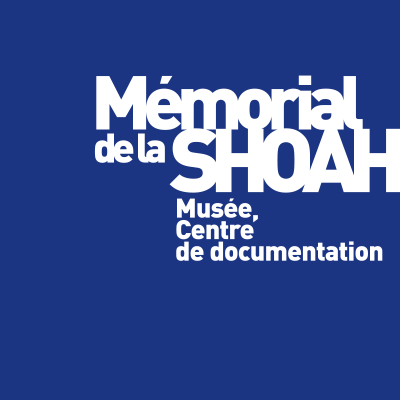The hosted associations
The Shoah Memorial hosts in its premises several associations linked by a common goal, to transmit the memory of the Holocaust: Jewish Memory of Paris, Memoirs of Convoy 6, National Council for the Memory of Deported Jewish Children (Comejd), Hidden Children, Convoi 77.
Jewish memory of Paris
The association aims to collect, gather and present photos and documents that escaped destruction during the war and trace the route of Jewish immigration and its integration into the nation from 1880 to 1948.
> Access the "Jewish Memory" site
Briefs of convoy 6
The purpose of the Association is to bring together people whose family member or friend was deported to Auschwitz-Birkenau by convoy N° 6 on 17 July 1942 from the Pithiviers camp in Loiret. The specificity of this convoy was to 'empty' the camps of Pithiviers and Beaune-la-Rolande to make way for the 'raided' of the Vel’ d'Hiv'.
> Access the site "Mémoires du convoi 6"
National Council for the Remembrance of Deported Jewish Children (Comejd)
To convey the memory of the deported Jewish children by seeking the assistance of national institutions, teachers and parent-teacher associations. This is the goal of the association, which regularly organizes memorial days with the support of regional prefects, and notably oversees the placement of commemorative plaques in French schools.
> Access the comejd site
The Hidden Children
The association of Hidden Children was an independent association (law of 1901) gathering, more particularly, Jewish people who, being children during the Second World War, were hidden to flee racial persecution.
It was created in 1992 to allow its members to express themselves, to testify and to transmit what they experienced during the Holocaust. She set up discussion groups that allowed the hidden children to find each other, to express their past difficulties, and to be attentive to others.
The association has created a memory library made up of complete testimonies of hidden children and saviors.
It has published a quarterly bulletin, distributed throughout the world, which has published numerous historical articles on individual or collective rescue and wanted notices with a view to finding saviors or fellow travelers.
Since 2002, and thanks to the operation "Paroles d'étoiles", the Association has been regularly solicited by the National Education to participate, from memory, in the formation of a responsible citizenship.
The association was dissolved in late 2008.
Convoy 77
The association "Convoi 77" was officially created on October 25, 2014. The Board of Directors is composed of 11 members. Three officers make up the Bureau: Georges Mayer, President – Véronique Likforman, Secretary-General – Henri Assouline, Treasurer.
The association Convoi 77 aims to gather around the families and friends of the deportees of convoy 77 – last large convoy that left Drancy on July 31, 1944, for Auschwitz, taking 1344 men to the death camp, women and children – all those concerned by the Memory of the Shoah in order to perpetuate the memory of the deportees, their history, their fate, to participate in the pursuit of transmitting the Memory of the Shoah as well as to make a contribution to research and teaching about the Shoah.
> Access the association’s website
Contact: convoi77auschwitz@gmail.com
Ibuka – Memory, Justice and Support for Survivors
The association Ibuka, officially "Ibuka – Memory, Justice and Support for survivors", is a non-governmental organization that works for the memory of the genocide of the Tutsi in Rwanda, justice for those responsible for genocidal crimes and support for survivors of the massacres perpetrated in 1994. 'Ibuka', in Kinyarwanda means 'Remember'.
The association was founded in Belgium on 16 August 1994. On 28 May 1995, an association with the same name was created in Switzerland with the same objective as its Belgian counterpart. On November 14, 1995, the association Ibuka was created in Rwanda. In France, the association was created later, in April 2002. These different structures bring together the survivors of the genocide, the relatives of the victims as well as all those working for the memory of the victims and the fate of the survivors of this genocide.
SITE OF IBUKA FRANCE
